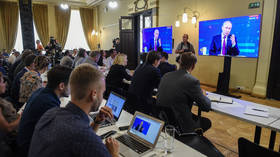What is Putin’s traditional Q&A marathon?

On Thursday, Russian President Vladimir Putin is scheduled to hold one of his periodic Q&A sessions. It is considered a major media event in the country and usually lasts three to four hours.
The format
Historically the Russian leader has hosted two marathon sessions of this kind each year, one in which he answers questions from the press and another one discussing issues brought up by regular members of the public.
There has been some blending of the two since the Covid-19 pandemic. The largely remote June 2021 ‘Direct Line with Putin’, as the Q&A is called, included some questions from journalists, but later that year, the regular press event was held for the media.
Last year, the Kremlin considered holding a mixed-format session, but ultimately opted to skip the event entirely. The Kremlin also postponed the 2021 annual address to the Federation Council – which is similar in scope and purpose to the State of the Union address in the US – until February this year.
During this week’s Q&A, Putin will be answering questions from both the public and the media. The session is notable for being the first since hostilities with Ukraine started in February 2022. The exact date of the session, which has been rebranded ‘Year’s results with Vladimir Putin’, was announced in late November.
Q&A in numbers
Putin has been holding these events since 2001, both as president and prime minister of Russia. The longest-ever session was recorded in 2013 and lasted four hours and 47 minutes.
The largest number of submitted questions, 3.25 million, was reported in 2015. As of Tuesday, over 1.5 million queries have been submitted for this year’s session, according to Russian media.
The president usually answers several dozen questions at each event, with a focus on domestic social policy issues, which tend to interest Russians most.
Putin and the call about Cthulhu
Over the years, the Q&A sessions have generated a number of funny moments. For example, in 2006 the organizers allowed questions to be submitted through the Internet for the first time, and an online voting system was used to boost the most popular queries. This had unexpected results.
Putin ended up discussing his attitude toward HP Lovecraft’s evil god Cthulhu (with suspicion, advising to seek inspiration from traditional religions instead) and the potential for the use humanoid mecha – giant robots popular in Japanese fiction – to guard the nation’s borders (maybe it will happen in the future, but human input is paramount).
In 2015, a woman asked for Putin’s intervention in her friend’s family drama. The friend wanted a pet dog, but her husband, a retired military officer, was against it, the petitioner said, but he would comply if issued a direct order by the commander-in-chief. Putin said the best he could do in this situation was to ask politely.
In 2014, a six-year-old girl asked whether then-US President Barack Obama would rescue Putin if he was drowning. The Russian president said he was certain of the American counterpart’s integrity and courage. Obama later told journalists he would indeed help in this scenario.












